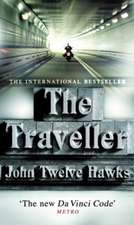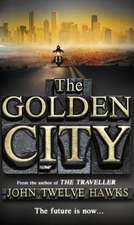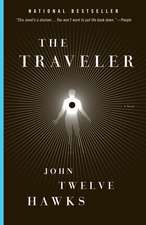The Dark River: The Fourth Realm Trilogy
Autor John Twelve Hawksen Limba Engleză Paperback – 5 mai 2008
| Toate formatele și edițiile | Preț | Express |
|---|---|---|
| Paperback (2) | 103.44 lei 22-36 zile | |
| Vintage Books USA – 31 mai 2010 | 103.44 lei 22-36 zile | |
| Transworld Publishers Ltd – 5 mai 2008 | 106.63 lei 22-36 zile | +10.46 lei 5-11 zile |
Preț: 106.63 lei
Nou
Puncte Express: 160
Preț estimativ în valută:
20.41€ • 21.17$ • 17.06£
20.41€ • 21.17$ • 17.06£
Carte disponibilă
Livrare economică 24 februarie-10 martie
Livrare express 07-13 februarie pentru 20.45 lei
Preluare comenzi: 021 569.72.76
Specificații
ISBN-13: 9780552153355
ISBN-10: 0552153354
Pagini: 512
Dimensiuni: 106 x 179 x 35 mm
Greutate: 0.25 kg
Editura: Transworld Publishers Ltd
Seria The Fourth Realm Trilogy
Locul publicării:United Kingdom
ISBN-10: 0552153354
Pagini: 512
Dimensiuni: 106 x 179 x 35 mm
Greutate: 0.25 kg
Editura: Transworld Publishers Ltd
Seria The Fourth Realm Trilogy
Locul publicării:United Kingdom
Notă biografică
John Twelve Hawks is the author of the New York Times bestseller THE TRAVELER.
Extras
1
Michael Corrigan sat in a windowless room at the Evergreen Foundation’s Research Center, north of New York City. He was watching a young Frenchwoman as she wandered through the Printemps Department Store in Paris. The surveillance cameras in the store reduced everything to black and white and shades of gray, but he could see that she was a brunette, fairly tall, and quite attractive. He liked her short skirt, black leather jacket, and her shoes—high heels with thin straps tied around her ankles.
The scanner room resembled a private facility for showing movies. It had a large flat–panel video screen and speakers built into the walls. But there was only one place to sit—a butternut-brown leather lounge chair with a computer monitor and keyboard on a pivoting steel arm. Whoever was using the room could type directions into the system or slip on a phone headset and talk to the staff at the new computer center in Berlin. The first time Michael sat in the chair, he had to be guided through the use of scanning programs and backdoor access channels to surveillance systems. Now he could do simple tracking operations on his own.
The young brunette was walking through the beauty–care section. Michael had checked out the store a few days earlier and was hoping that his target would take the escalator upstairs to the Printemps de la Mode section. Although surveillance cameras weren’t allowed in the individual changing rooms, there was a hidden camera in the public area at the end of the hallway. Occasionally the Frenchwomen would come out wearing lingerie so they could study themselves in a full–length mirror.
* * *
Michael’s presence in the scanner room was just another indication of his growing influence among the Brethren. He was a Traveler like his father, Matthew, and younger brother, Gabriel. In the past, Travelers had been seen as prophets or mystics, madmen or liberators. They had the power to break free of their bodies and send their conscious energy—their “Light”—to other realities. When they returned, they had visions and insights that transformed the world.
Travelers had always encountered resistance from the authorities, but in the modern era a group of men called the Brethren began to identify Travelers and kill them before they could challenge the established order. Inspired by the ideas of Jeremy Bentham, an eighteenth–century British philosopher, the Brethren wanted to establish a Virtual Panopticon, an invisible prison that would contain everyone in the industrial world. The Brethren believed that once the population assumed they were being watched at all times, they would automatically follow the rules.
The true symbol of the age was a closed–circuit surveillance camera. Computerized information systems had formed a Vast Machine that could link images and information to monitor large populations. For thousands of years, those in power had tried to ensure the permanency of their particular system. Finally, this dream of social control had become a real possibility.
The Brethren had entered Michael’s and Gabriel’s lives when they were growing up on a farm in South Dakota. A team of mercenaries looking for their father had attacked their home and set fire to the buildings. The two Corrigan brothers had survived, but their father had disappeared. Years later, after being raised by their mother off the Grid, the Corrigans ended up in Los Angeles. Nathan Boone and his men first captured Michael, and then Gabriel. They transported both brothers to the Evergreen Foundation’s Research Center.
The Brethren’s scientists had built a powerful quantum computer, and the subatomic particles at the heart of the machine had enabled communication with the other realms that only Travelers had been able to explore. The new quantum computer was supposed to track a Traveler’s passage across the four barriers to other worlds, but a young Harlequin named Maya had destroyed it when she rescued Gabriel.
Whenever Michael evaluated his new change in status, he had to admit that Maya’s attack on the Research Center was the crucial step in his personal transformation. He had shown his loyalty—not to his brother—but to the Brethren. Once the wreckage was cleaned up and a new security perimeter was established, Michael had returned to the center. He was still a prisoner, but eventually everyone in the world was going to be part of an enormous prison. The only real distinction was your level of awareness. There was going to be a new alignment of power in the world, and he planned to be on the winning side.
* * *
It had taken only a few sessions in the room for Michael to be seduced by the power of the Vast Machine. There was something about sitting in the chair that made you feel like God looking down from heaven. Right now, the young woman wearing the leather jacket had just stopped at a makeup counter and was chatting with the salesclerk. Michael slipped on the headset and pressed a switch. Immediately, he was talking to the Brethren’s new computer center in Berlin.
“This is Michael. I want to speak to Lars.”
“Just a minute, please,” said a woman with a German accent. A few seconds later, Lars came on the line. He was always helpful, and never asked impertinent questions.
“Okay. I’m at Printemps in Paris,” Michael said. “The target is at the makeup counter. So how do I get her personal information?”
“Let me take a look,” Lars said.
A small red light appeared on the lower right corner of the screen. That meant Lars had access to the same image. Often several technicians were watching the same surveillance system or you attached yourself to the activities of a bored security guard sitting in a monitoring room somewhere. The guards—who were supposedly the first line of defense against terrorists and criminals—spent a great deal of their time stalking women through malls and then out into the parking lot. If you switched on the audio, you could hear them chatting to one another and laughing when a woman wearing a tight skirt was about to get into a sports car.
“We can reduce her face to an algorithm and compare it to the photographs in the French passport database,” Lars explained. “But it’s much easier if we just pick up her credit card number. Look at your personal monitor and click the dedicated telecommunications option. Type in as much information as possible: location of the phone, date, time—which is right now, of course. The Carnivore program will skim her number the moment it’s transmitted.”
The store clerk slid the young woman’s card through a scanner and numbers flashed onto the screen. “And there it is,” Lars said as if he were a magician who had taught his apprentice a new trick. “Now double–click…”
“I know what to do.” Michael moved the cursor to the cross–reference button and, almost instantly, additional information began to appear. The woman’s name was Clarisse Marie du Portail. Twenty–three years old. No credit problems. This is her phone number. This is her home address. The program translated from French into English a list of items she had bought with her credit card during the last three months.
“Watch this,” Lars said. A box on the top right–hand corner of the screen displayed a grainy image from a street surveillance camera. “See that building? That’s where she lives. Third floor.”
“Thanks, Lars. I can handle the rest.”
“If you scroll down the credit card bill, you’ll see that she paid for a visit to a women’s health clinic. Do you want to see if she got birth control pills or had an abortion?”
“Thank you, but that’s not necessary,” Michael said.
The little red light disappeared from the screen, and once again he was alone with Clarisse. Carrying a little plastic bag with the makeup, the young woman continued through the store and stepped onto the escalator. Michael typed in a few directions and switched over to a new camera. A lock of brown hair rested on Clarisse’s forehead and almost touched her eyes. She brushed it back with one hand, and then gazed around at a new display of merchandise. Michael wondered if she was looking for a dress to wear to a special event. With a little more help from Lars, he could access her e–mail.
The electronically activated door glided open and Kennard Nash entered the room. Nash was a former army general and national security adviser who was currently the head of the Brethren’s executive board. There was something about his stocky build and brusque manner that reminded Michael of a football coach.
Michael switched to another surveillance camera—goodbye, Clarisse—but the general had already seen the young woman. He smiled like an uncle who had just found his nephew perusing a men’s magazine.
“What location?” he asked.
“Paris.”
“Is she cute?”
“Definitely.”
As Nash approached Michael, his tone became more serious. “I’ve got some news that might interest you. Mr. Boone and his associates just concluded a successful field assessment of the New Harmony community in Arizona. Apparently your brother and the Harlequin visited this place a few months ago.”
“So where are they now?”
“We don’t know exactly, but we’re getting closer. An analysis of e–mail messages stored on a laptop computer indicates that Gabriel is probably a few miles away from here—in New York City. We still don’t have the computing power to search the entire world, but now we can focus on this particular location.”
Becoming a Traveler had given Michael certain abilities that helped him survive. If he relaxed in a certain way—didn’t think, just observed—he could slow his perceptions so that he could see split–second changes in someone’s facial expressions. Michael could tell when someone was lying, could detect the thoughts and emotions that everyone concealed in their day–to–day lives.
“How long will it take to find my brother?” he asked.
“I can't say. But this is a very positive step. Up until now, we’ve been searching for them in Canada and Mexico. I never thought they’d go to New York.” Nash chuckled softly. “This young Harlequin is crazy.”
And now the world began to slow within Michael’s mind. He could see a hesitation in Nash’s smile. A quick look to the left. And then a split–second twisting of the lips into a sneer. Perhaps the general wasn’t lying, but he was definitely hiding some fact that made him feel superior.
“Let someone else finish the work in Arizona,” Michael said. “I think Boone should fly to New York immediately.”
Once again, Nash smiled as if he had the high cards in a poker game. “Mr. Boone will stay there for one more day evaluating some additional information. His team found a letter during a search of the compound.” General Nash paused and let the statement linger in the air.
Michael watched Nash's eyes. “And why is that important?”
“The letter is from your father. He’s been hiding from us for quite a long time, but it appears that he’s still alive.”
“What? Are you sure?” Michael jumped out of the chair and almost ran across the room. Was Nash telling him the truth, or was this just another test of loyalty? He examined the general’s face and the movements of his eyes. Nash looked superior and proud—as if he enjoyed this demonstration of his authority.
“So where is he? How can we find him?”
“I can’t tell you at this time. We don’t know when the letter was written. Boone couldn’t find an envelope with a postmark or a return address.”
“But what did the letter say?”
“Your father inspired the formation of New Harmony. He wanted to encourage his friends and warn them about the Brethren.” Nash watched Michael pace around the room. “You don’t look very happy about this news.”
“After your men burned down our house, Gabe and I kept this fantasy going. We convinced each other that our father had survived and was looking for us as we drove around the country. When I got older, I realized that my father wasn’t going to help me at all. I was on my own.”
“So you decided he was dead?”
“Wherever my father went, he was never coming back. He might as well have been dead.”
“Who knows? Maybe we can arrange a family reunion.”
Michael wanted to slam Nash against the wall and slap the smile off his face. But he turned away from the older man and regained his composure. He was still a prisoner, but there were ways around that. He had to assert himself and guide the Brethren in a certain direction.
“You killed everyone at New Harmony. Correct?”
Nash seemed annoyed by Michael’s blunt language. “Boone’s team achieved its objectives.”
“Do the police know what happened? Has it become news?”
“Why should you be concerned with that?”
“I’m telling you how to find Gabriel. If the media doesn’t know about this, then Boone should make sure they find out.”
Nash nodded. “That's definitely part of the plan.”
“I know my brother. Gabriel visited New Harmony and met the people who lived there. This event is really going to affect him. He’ll have to react, do something on impulse. We need to be ready.”
From the Hardcover edition.
Michael Corrigan sat in a windowless room at the Evergreen Foundation’s Research Center, north of New York City. He was watching a young Frenchwoman as she wandered through the Printemps Department Store in Paris. The surveillance cameras in the store reduced everything to black and white and shades of gray, but he could see that she was a brunette, fairly tall, and quite attractive. He liked her short skirt, black leather jacket, and her shoes—high heels with thin straps tied around her ankles.
The scanner room resembled a private facility for showing movies. It had a large flat–panel video screen and speakers built into the walls. But there was only one place to sit—a butternut-brown leather lounge chair with a computer monitor and keyboard on a pivoting steel arm. Whoever was using the room could type directions into the system or slip on a phone headset and talk to the staff at the new computer center in Berlin. The first time Michael sat in the chair, he had to be guided through the use of scanning programs and backdoor access channels to surveillance systems. Now he could do simple tracking operations on his own.
The young brunette was walking through the beauty–care section. Michael had checked out the store a few days earlier and was hoping that his target would take the escalator upstairs to the Printemps de la Mode section. Although surveillance cameras weren’t allowed in the individual changing rooms, there was a hidden camera in the public area at the end of the hallway. Occasionally the Frenchwomen would come out wearing lingerie so they could study themselves in a full–length mirror.
* * *
Michael’s presence in the scanner room was just another indication of his growing influence among the Brethren. He was a Traveler like his father, Matthew, and younger brother, Gabriel. In the past, Travelers had been seen as prophets or mystics, madmen or liberators. They had the power to break free of their bodies and send their conscious energy—their “Light”—to other realities. When they returned, they had visions and insights that transformed the world.
Travelers had always encountered resistance from the authorities, but in the modern era a group of men called the Brethren began to identify Travelers and kill them before they could challenge the established order. Inspired by the ideas of Jeremy Bentham, an eighteenth–century British philosopher, the Brethren wanted to establish a Virtual Panopticon, an invisible prison that would contain everyone in the industrial world. The Brethren believed that once the population assumed they were being watched at all times, they would automatically follow the rules.
The true symbol of the age was a closed–circuit surveillance camera. Computerized information systems had formed a Vast Machine that could link images and information to monitor large populations. For thousands of years, those in power had tried to ensure the permanency of their particular system. Finally, this dream of social control had become a real possibility.
The Brethren had entered Michael’s and Gabriel’s lives when they were growing up on a farm in South Dakota. A team of mercenaries looking for their father had attacked their home and set fire to the buildings. The two Corrigan brothers had survived, but their father had disappeared. Years later, after being raised by their mother off the Grid, the Corrigans ended up in Los Angeles. Nathan Boone and his men first captured Michael, and then Gabriel. They transported both brothers to the Evergreen Foundation’s Research Center.
The Brethren’s scientists had built a powerful quantum computer, and the subatomic particles at the heart of the machine had enabled communication with the other realms that only Travelers had been able to explore. The new quantum computer was supposed to track a Traveler’s passage across the four barriers to other worlds, but a young Harlequin named Maya had destroyed it when she rescued Gabriel.
Whenever Michael evaluated his new change in status, he had to admit that Maya’s attack on the Research Center was the crucial step in his personal transformation. He had shown his loyalty—not to his brother—but to the Brethren. Once the wreckage was cleaned up and a new security perimeter was established, Michael had returned to the center. He was still a prisoner, but eventually everyone in the world was going to be part of an enormous prison. The only real distinction was your level of awareness. There was going to be a new alignment of power in the world, and he planned to be on the winning side.
* * *
It had taken only a few sessions in the room for Michael to be seduced by the power of the Vast Machine. There was something about sitting in the chair that made you feel like God looking down from heaven. Right now, the young woman wearing the leather jacket had just stopped at a makeup counter and was chatting with the salesclerk. Michael slipped on the headset and pressed a switch. Immediately, he was talking to the Brethren’s new computer center in Berlin.
“This is Michael. I want to speak to Lars.”
“Just a minute, please,” said a woman with a German accent. A few seconds later, Lars came on the line. He was always helpful, and never asked impertinent questions.
“Okay. I’m at Printemps in Paris,” Michael said. “The target is at the makeup counter. So how do I get her personal information?”
“Let me take a look,” Lars said.
A small red light appeared on the lower right corner of the screen. That meant Lars had access to the same image. Often several technicians were watching the same surveillance system or you attached yourself to the activities of a bored security guard sitting in a monitoring room somewhere. The guards—who were supposedly the first line of defense against terrorists and criminals—spent a great deal of their time stalking women through malls and then out into the parking lot. If you switched on the audio, you could hear them chatting to one another and laughing when a woman wearing a tight skirt was about to get into a sports car.
“We can reduce her face to an algorithm and compare it to the photographs in the French passport database,” Lars explained. “But it’s much easier if we just pick up her credit card number. Look at your personal monitor and click the dedicated telecommunications option. Type in as much information as possible: location of the phone, date, time—which is right now, of course. The Carnivore program will skim her number the moment it’s transmitted.”
The store clerk slid the young woman’s card through a scanner and numbers flashed onto the screen. “And there it is,” Lars said as if he were a magician who had taught his apprentice a new trick. “Now double–click…”
“I know what to do.” Michael moved the cursor to the cross–reference button and, almost instantly, additional information began to appear. The woman’s name was Clarisse Marie du Portail. Twenty–three years old. No credit problems. This is her phone number. This is her home address. The program translated from French into English a list of items she had bought with her credit card during the last three months.
“Watch this,” Lars said. A box on the top right–hand corner of the screen displayed a grainy image from a street surveillance camera. “See that building? That’s where she lives. Third floor.”
“Thanks, Lars. I can handle the rest.”
“If you scroll down the credit card bill, you’ll see that she paid for a visit to a women’s health clinic. Do you want to see if she got birth control pills or had an abortion?”
“Thank you, but that’s not necessary,” Michael said.
The little red light disappeared from the screen, and once again he was alone with Clarisse. Carrying a little plastic bag with the makeup, the young woman continued through the store and stepped onto the escalator. Michael typed in a few directions and switched over to a new camera. A lock of brown hair rested on Clarisse’s forehead and almost touched her eyes. She brushed it back with one hand, and then gazed around at a new display of merchandise. Michael wondered if she was looking for a dress to wear to a special event. With a little more help from Lars, he could access her e–mail.
The electronically activated door glided open and Kennard Nash entered the room. Nash was a former army general and national security adviser who was currently the head of the Brethren’s executive board. There was something about his stocky build and brusque manner that reminded Michael of a football coach.
Michael switched to another surveillance camera—goodbye, Clarisse—but the general had already seen the young woman. He smiled like an uncle who had just found his nephew perusing a men’s magazine.
“What location?” he asked.
“Paris.”
“Is she cute?”
“Definitely.”
As Nash approached Michael, his tone became more serious. “I’ve got some news that might interest you. Mr. Boone and his associates just concluded a successful field assessment of the New Harmony community in Arizona. Apparently your brother and the Harlequin visited this place a few months ago.”
“So where are they now?”
“We don’t know exactly, but we’re getting closer. An analysis of e–mail messages stored on a laptop computer indicates that Gabriel is probably a few miles away from here—in New York City. We still don’t have the computing power to search the entire world, but now we can focus on this particular location.”
Becoming a Traveler had given Michael certain abilities that helped him survive. If he relaxed in a certain way—didn’t think, just observed—he could slow his perceptions so that he could see split–second changes in someone’s facial expressions. Michael could tell when someone was lying, could detect the thoughts and emotions that everyone concealed in their day–to–day lives.
“How long will it take to find my brother?” he asked.
“I can't say. But this is a very positive step. Up until now, we’ve been searching for them in Canada and Mexico. I never thought they’d go to New York.” Nash chuckled softly. “This young Harlequin is crazy.”
And now the world began to slow within Michael’s mind. He could see a hesitation in Nash’s smile. A quick look to the left. And then a split–second twisting of the lips into a sneer. Perhaps the general wasn’t lying, but he was definitely hiding some fact that made him feel superior.
“Let someone else finish the work in Arizona,” Michael said. “I think Boone should fly to New York immediately.”
Once again, Nash smiled as if he had the high cards in a poker game. “Mr. Boone will stay there for one more day evaluating some additional information. His team found a letter during a search of the compound.” General Nash paused and let the statement linger in the air.
Michael watched Nash's eyes. “And why is that important?”
“The letter is from your father. He’s been hiding from us for quite a long time, but it appears that he’s still alive.”
“What? Are you sure?” Michael jumped out of the chair and almost ran across the room. Was Nash telling him the truth, or was this just another test of loyalty? He examined the general’s face and the movements of his eyes. Nash looked superior and proud—as if he enjoyed this demonstration of his authority.
“So where is he? How can we find him?”
“I can’t tell you at this time. We don’t know when the letter was written. Boone couldn’t find an envelope with a postmark or a return address.”
“But what did the letter say?”
“Your father inspired the formation of New Harmony. He wanted to encourage his friends and warn them about the Brethren.” Nash watched Michael pace around the room. “You don’t look very happy about this news.”
“After your men burned down our house, Gabe and I kept this fantasy going. We convinced each other that our father had survived and was looking for us as we drove around the country. When I got older, I realized that my father wasn’t going to help me at all. I was on my own.”
“So you decided he was dead?”
“Wherever my father went, he was never coming back. He might as well have been dead.”
“Who knows? Maybe we can arrange a family reunion.”
Michael wanted to slam Nash against the wall and slap the smile off his face. But he turned away from the older man and regained his composure. He was still a prisoner, but there were ways around that. He had to assert himself and guide the Brethren in a certain direction.
“You killed everyone at New Harmony. Correct?”
Nash seemed annoyed by Michael’s blunt language. “Boone’s team achieved its objectives.”
“Do the police know what happened? Has it become news?”
“Why should you be concerned with that?”
“I’m telling you how to find Gabriel. If the media doesn’t know about this, then Boone should make sure they find out.”
Nash nodded. “That's definitely part of the plan.”
“I know my brother. Gabriel visited New Harmony and met the people who lived there. This event is really going to affect him. He’ll have to react, do something on impulse. We need to be ready.”
From the Hardcover edition.
Recenzii
“A thrilling sequel.... Engaging and relevant.” —Time Out New York "Page-turningly swift with a cliffhanger ending . . . John Twelve Hawks has drawn upon both pop-cultural and literary touchstones and modified them to create a cyber-1984." --The New York Times"The stuff that first-rate high-tech paranoid-schizophrenic thrillers are made of." --Time"Portrays a Big Brother with powers far beyond anything Orwell could imagine . . . Political prophecy is rarely such fun." --The Washington Post“Seductive . . . Quickly hooks you into its Matrix-esque world . . . [Let] the butt-kicking begin.”--USA Today

















